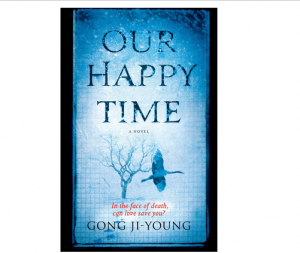 If you don’t like a stacked deck, you may not like Gong Ji-Young’s Our Happy Time. While Gong does write a cracking tale, she piles freighted detail upon freighted detail, and horrible history upon horrible history, to ensure that the reader has no emotional wiggle-room with her characters. With that said, it’s a compelling read and often contains sharply driven analysis and judgment on modern society, particularly Korean society.
If you don’t like a stacked deck, you may not like Gong Ji-Young’s Our Happy Time. While Gong does write a cracking tale, she piles freighted detail upon freighted detail, and horrible history upon horrible history, to ensure that the reader has no emotional wiggle-room with her characters. With that said, it’s a compelling read and often contains sharply driven analysis and judgment on modern society, particularly Korean society.
Our Happy Time is the story of a depressed (as it develops, for entirely good, if melodramatic reasons) woman Yujeong, her saintly aunt Monica, and the relationship they develop with a death row inmate named Yunsu. The plot unwinds as is traditional in these stories (in English consider Dead Man Walking, Green Mile, Beyond the Call, and many others), with the inmate becoming more and more of a sympathetic character, and the two female characters falling in different versions of love with him.
The story slips back and forth between Yujeong’s memory of events and a series of “Blue Notes” in which Yunsu reveals his backstory. As the story evolves, Gong attempts to put a shinier face on Yunsu’s crime, which seems to be cheating the story a bit in order to create emotional drama. The same is true of the presentation of Yujeong, who reveals her own history to Yunsu. Yujeong is a one-time minor popstar with a horrible family history that has driven her to multiple suicide attempts. In fact, the most compelling, and in fact indelible character, is Aunt Monica, a nun of deep emotional reserves, considerable thought, and a nearly endless heart. Gong’s characterization of Aunt Monica is priceless, and it is Aunt Monica’s sympathetic steeliness that gives Our Happy Time the backbone it needs to carry off the emotional ploys it engages elsewhere.
The themes of Our Happy Time are triple, that all people are complicated and contain both good and bad, that abuse engenders abuse, and that society is uncaring at best, set up to be evil at worst (some fault for which, Gong places at the feet of that revered Korean character, the mother). Sometimes Gong whacks the reader over the head with these themes, including a transparent scene towards the middle of the book in which Yujeong’s psychiatrist uncle gives a political/social speech of several pages in which, which is fed by lines from Yujeong and Aunt Monica that seem scripted to keep the uncle talking. The Uncle tendentiously declares that no one is innately evil, that all violence is caused by previous violence, and thus passed from generation to generation. Occasionally, Gong could have pulled back from her tendency to lay everything out on the surface.^^
The book is entertaining and clever (and probably upset some Koreans^^) in the way that Gong has Yujeong cast a critical eye on elements of modern Korean society. Yujeong’s general alienation is an excellent platform for observation, and Gong does not waste the opportunity, with Yujeong contemplating little evils (Korea’s sometimes amazing public rudeness) and large (“Good” people who are happy to contain endless reservoirs of evil within). These passages, like Aunt Monica, work to give Our Happy Time a grittiness that works to keep the romantic plot in context and balanced.
This is the kind of book that seems to be crying out for a movie treatment, and I certainly hope someone in Hollywood is reading it right now. This is a “keep tissues nearby” kind of read, and despite its occasional over-explanatory dialogue, will keep most people reading through until the end. While Gong’s work can be over-freighted, it is nonetheless dramatic and satisfying, and in Korea’s current climate Gong counts as one of literature’s heroes. She is unafraid, old-style-Korean-author, to step up to political issues and address them head on, and Our Happy Time does just that.
In an interview at 10 Magazine’s Book club in June, Gong said that the publication of her book substantially increased the percentage of people opposed to the death penalty in Korea, and I don’t doubt it. This, actually, is very Gong-like, as Gong is also the author of The Crucible (The book is Dogani, or 도가니, in Korea, and it was also turned into a movie titled Silence), a book about abuse of the handicapped that was so influential that it actually resulted in a change in Korean law that was named after the book, and the ludicrous spectacle of the Korean Grand National Party (now the Saenuri) calling for a police investigation into Gong, saying, ““Gong needs to be investigated because she is already engaging in political activities.”
Ludicrous… pick up the book and see why Gong pisses off the (now) Saenuri Party.^^
Available on Amazon
In paperback or Kindle


